10 September 2015
Karterados
It took just under two hours on waves from Heraklion to Thira. Hellenic Seaways - even the name suggested some grand adventure - but all it involved was me sitting by the window eating cheese toasts and daydreaming/staring at the sea/reading my borrowed and slightly outdated (but very useful) Santorini guide book. Still, this is the closest I've come to a cruise and I'm definitely not complaining.
Deposited in the Cyclades, I proceeded to take my time "exploring" Santorini's port (just a bunch of shops; I wanted to buy water), and ended up missing the hourly bus into town. But instead of getting annoyed, I reminded myself that Island Life, or so I've read, is all about taking it slow and easy. Life works in mysterious ways, because when I took the next bus an hour later, I made a friend, headed to the same hostel as me, who I would end up spending the next three days with.
Once an 18th century winery, Caveland hostel is all aquamarine pools, pumice caves, pastel walls, cobblestones, bougainvilleas and friendly pets. The kitty took a fancy to me, curling itself around my legs. We arrived a couple of hours before check in, but in true Island Life style, didn't head out to sightsee. Instead we found ourselves in the homely kitchen with travellers from every country imaginable, from South America to Australia, also biding their time. We swapped stories and recommendations over assorted cups of tea.
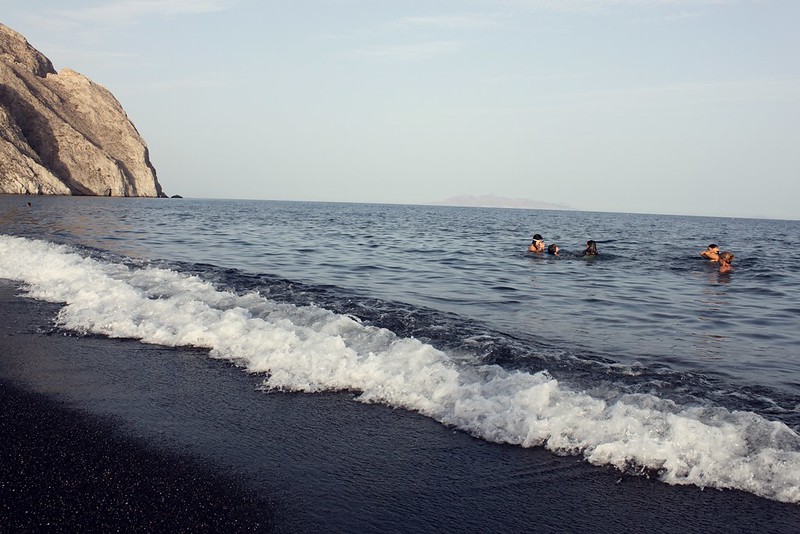
10 September 2015
Perissa
Late afternoon found me and my new Argentinian friend at the bus stop munching fresh chicken rolls from one of the three bakeries in the neighbourhood (seriously, I love Greek bakeries), ready for our journey to Santorini's black beaches. Kamari and Perissa are separated by a giant rock - nothing a short boat ride (or walk) can't conquer - and consist of trademark black pebbles and sand, a legacy of the island's volcanic history. Reading, sea-gazing, drinking Greek frappés, talking. I'm not sure how many hours we walked, but we left some footprints and abandoned judgements and first impressions on the shore.
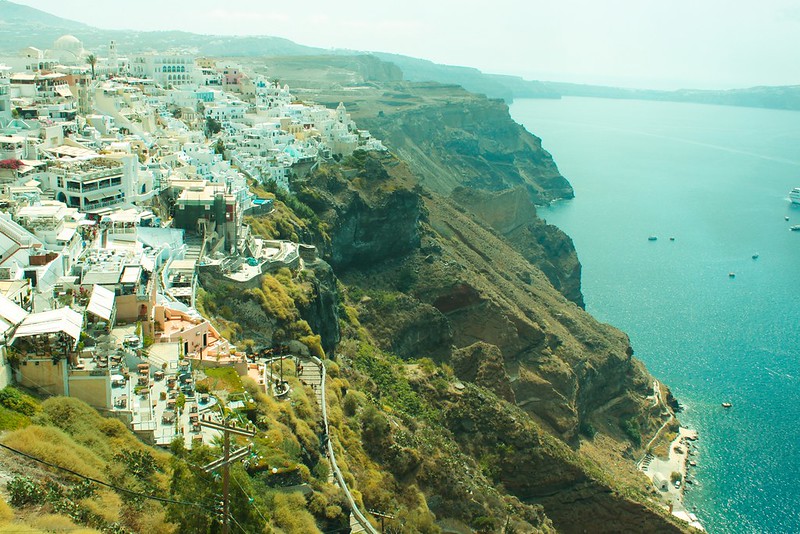
12 September 2015
Oia
Fira by day is as beautiful as Fira by night. Well, okay - maybe it's slightly more beautiful at night, I mean, it glitters. Today was the day of the Big Hike. Everyone at breakfast told us we were crazy to attempt it in this heat and that they were really glad to have met us "in case you don't survive it". Cheery bunch. The hike in question was from Fira to Oia, passing through Firostefani and Imerovigli, supposed to take around three and a half hours without stops (not that challenging, right?). We decided to do it in a more leisurely manner, experiencing the villages and stopping for lunch at Imerovigli. Nonetheless, it took us less than the estimated time; we took the colour of the sun, lost buckets of sweat, witnessed some breathtaking views and finally arrived at the white-icing pavements of gleaming Oia.
Not for no reason is Oia a popular romantic and wedding destination. It felt like another world, albeit with a lot of people, as we shared a gigantic banana split sundae (our reward), applauded the sunset, ran into - for the third time in two days - new Dutch friends, and were hailed by fellow hikers who we didn't recognise because they, unlike us, had had time to shower. We felt quite famous.
Stepped down into the quaintest bookshop, Atlantis Books, with first folios and walls adorned with quotes. By a lucky coincidence, found ourselves in the midst of the Caldera Arts and Literature Festival: piano concert by Julian Gargiulo, a talk on a fairy-lighted terrace by David Sedaris, an unforgettable concert of Cretan folk music by the Ross Daly Quartet. We returned again the next night.
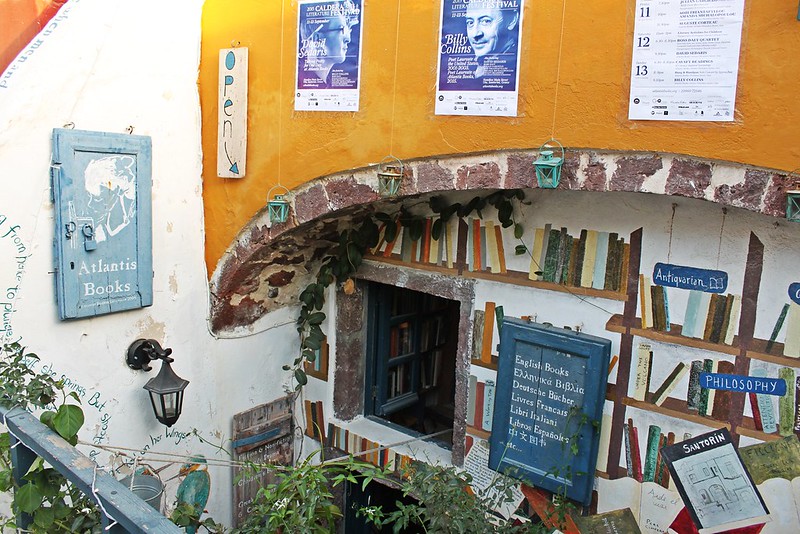
As I recalled Gargiulo's rendition of Moonlight Sonata on the bus back to Fira, I thought about all the people I've met, all the stories I've collected; how people always surprise me, how glad I am to have been wrong about them; about why people travel, especially why they travel alone. Death and heartbreak seemed recurring themes, but also discovery, one person in one head, the quest for the self. Maybe the whole point of travel is to teach us about the ephemeral, to stir up our soul and send us back, to stretch us out, to open us; for us to pass through, for the world to pass through us.
Perhaps, like Odysseus, we need to roam; the closer we come to understanding, the further away it seems. But there's a homecoming in acceptance.
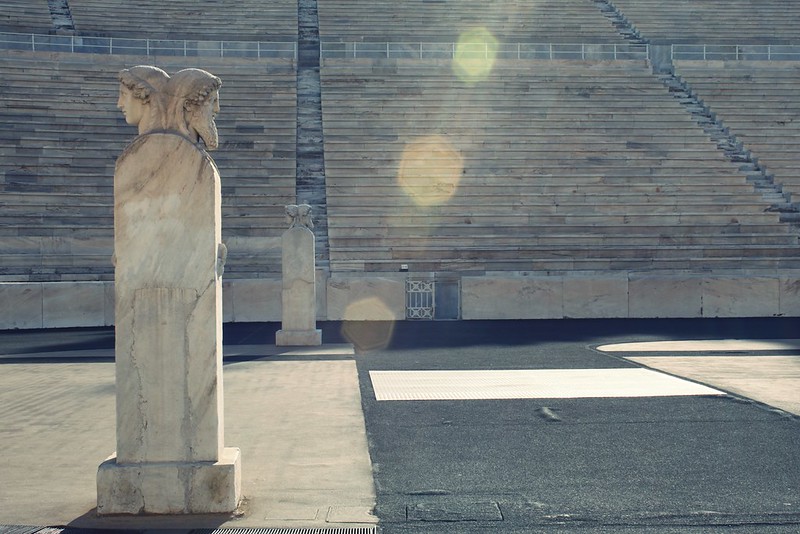
14 September 2015
Athens
Late afternoon stroll through Syntagma Square (the only signs that an election approaches in five days was a small booth in the corner adorned with candidate posters; "the people are just tired of it all," my friend would later say), by the Parliament and its pigeons, National Gardens, busts of a trio of ancient tragedians (Euripides, Sophocles, Aeschylus) and the Zappeion, to the ancient Panathenaic Stadium. It was here that the first Olympic Games were hosted in 1896, before which the stadium was reconstructed - it now looks quite modern, though traces of history have been preserved. The free audio guide was a nice surprise and actually transformed the experience - I started without it and went back to get it - submerging me into the history and stories of this historical site so completely that I could almost picture it all. What would otherwise have been a quick look at rows of marble and a few photographs turned into nearly two hours of connecting with a place with the voice of a stranger and the sound of applause in my ears. I felt transported.
Souvenir shopping in Monastiraki, serendipitously bumping into a friend on the metro, visiting the soon-to-open restaurant of another friend in Kolonaki, and introducing two lovely people over sandwiches and green cushions. Time flies in good company.
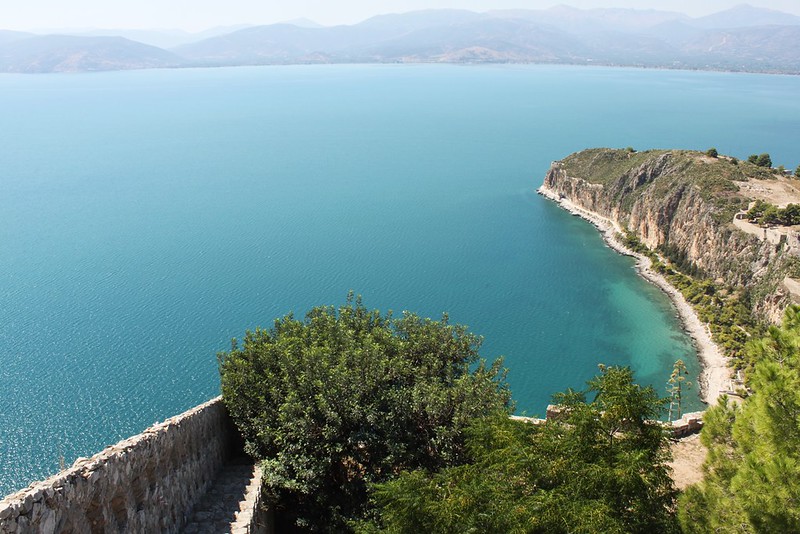
15 September 2015
Nafplio
A bus drive of sparkling blue waters, so distractingly beautiful that I cannot concentrate on my book (The Island by Victoria Hislop), past the Corinth Canal, with a generous helping of sea; it takes two hours to arrive in Nafplio, the jewel of the Argolid. The strong sunlight shows off the colours to their best advantage, and whatever I expected from the Peloponnese, it wasn't this. I thought I'd be travel-worn, seeing another town with almost indifferent eyes that have seen too much in very little time, but I should have trusted my friend's insistence. The capital of the First Hellenic Republic, Nafplio looks Italian - or so I've been told, never having visited Italy myself. It arrests my vision, accosts me with colour, and I'm not sure where to turn. Every street invites, every square adorned with a building or statue that merits closer examination, and yet in the periphery of my line of sight, always a castle or fortress demanding attention.
Time is short, however, and after a detailed Q&A at the tourist office, I come up with a rare (for me) but, as it would turn out, smart plan: I buy a ticket for the red red HoHo bus, and rely on it to get me where I need to go. I chat with the driver and she hands me a set of earphones for an audio history of the town. Highlight: Palamidi Castle (alternatively reachable by way of
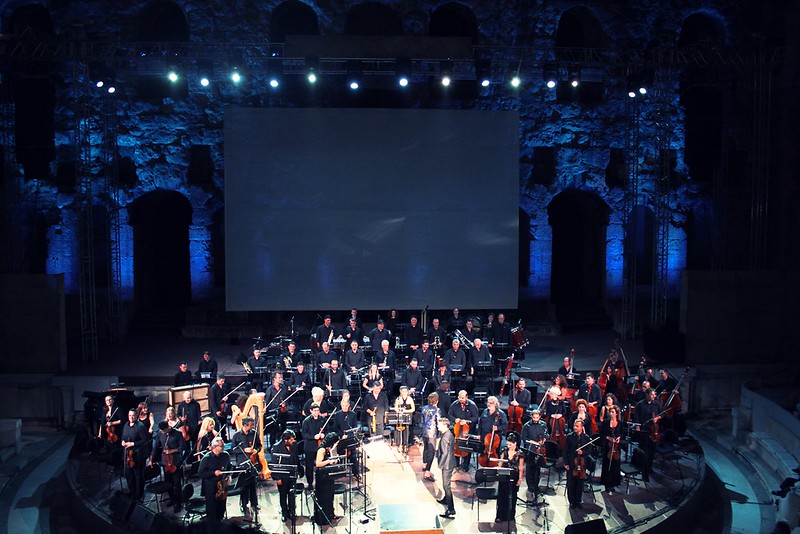
15 September 2015
Odeon of Herodes Atticus, Athens
The scene: A gigantic, ancient amphitheatre made of gleaming pentelic marble; cool twilight breeze; in front, the ruins of an arch arrayed with windows; below, a stage set up for the Athens State Orchestra; above, a sky peppered with stars; behind, the glowing Parthenon; around, more than 5000 people gradually taking their places on hard backless rows. Me: in the centre of the theatre, a few rows up, a complimentary seat with a good view thanks to a press pass I received after I'd already paid for another, probably inferior seat, but I don't think about that, I only watch the theatre fill up around me, awestruck, perversely wondering if I'll be fighting vertigo or claustrophobia, deep breaths deep breaths. It's hard not to feel minuscule; the sheer size and capacity of the theatre is overwhelming. I focus on other things, details, like how the ushers are all beautiful women dressed in white shirts and black skirts who say "yassas" and show you to your place, and how some people have brought collapsible seats - "a very Greek thing to do", I am later informed. The occasion: a collateral event of the Athens-Epidaurus Festival, a concert by Rufus Wainwright and excerpts from his opera Prima Donna. The sound of 5000 people applauding; all parts of a whole. Of course the tallest man in the theatre sits in front of me. I look at the row of friends directly below me and feel a bit alone. They all seem well put together. I give them backstories. The French libretto that I don't understand, the emotion in the music that I do. Harpsichords, violins, cellos cry for each other. On the screen, a gloved hand traces the visage of a figurine. Cindy Sherman as Maria Callas blows out candles and accepts her fate. Everything is ephemeral, I remember. The evening is longer than I thought; like many of the audience, I consider leaving during the intermission so that I can take the train, but I'm here, and I have a great seat, and I'm curious, and my back isn't hurting all that much. Wainwright presents himself now, singing mellifluously, effortlessly making his audience laugh. The breeze gets colder and I wrap a shawl around myself and decide to enjoy the moment and worry about getting home later. Wainwright drops his sheet music and cranes over to read the one in front of the soprano while singing Mozart. Leonard Cohen's "Anthem", "Cigarettes and Chocolate Milk".
Alone in a still-new city at 2 a.m., I hail a cab like the others. I enunciate the address, and five minutes later we pick up some strangers. I am apprehensive, but not terrified - I note this with interest. Something about trusting your gut.
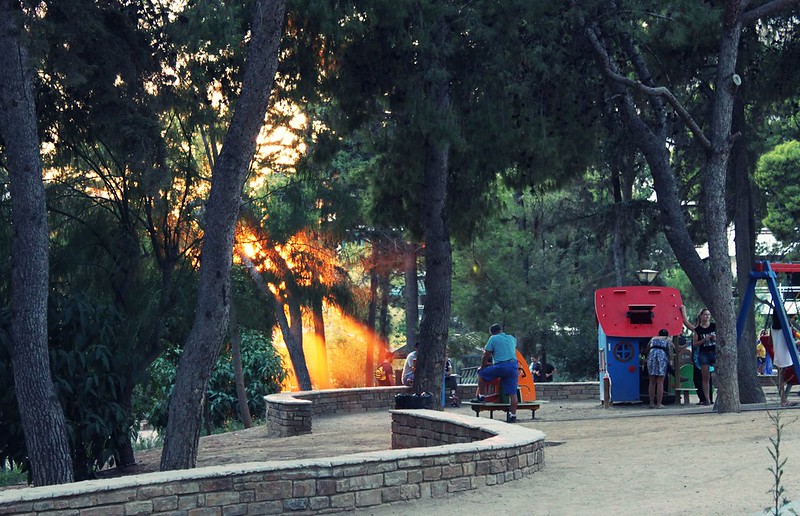
16 September 2015
Athens
Omonia. The reputation of some neighbourhoods precedes them. I knew nothing of it the first time, but as I arrived in Omonia for the third time in three days, the things I'd heard echoed loudly in my head. This was a different Athens - one of those pockets in every city that lies hidden away from tourists. My destination was Plato's Academy, a mysterious place that the internet only yielded sketchy information about, and given my inability to find the bus stop two days ago, I decided to take a cab - only to be met with a clueless shake of the head. I walked on resolutely, past cars, people, trash can rummagers, swaying old men. It's all in my head, I told myself, and kept going until I finally found the bus stop. Ignoring stares, I stood self consciously waiting for the bus; getting on, I told the driver where I wanted to go, only to be met with another blank stare. "No English," he said, so I tried in Greek: "Akadimia Platonos?" A shake of the head, some gesticulating. I decided I'd had enough adventure; I memorised the turns we took, got off at the next stop and walked all the way back to the metro. Something about trusting your gut.
Instead, I wandered the streets of Anafiotika and ate cookie ice cream.
Later that evening, in Nea Smyrni, I watched the Greek National Theatre perform Euripides' The Trojan Women. The performance was in Greek, but after a slight struggle, I recalled enough of the play I'd read in English a few days ago - ah, that's Poseidon and Athena discussing Troy - and followed along. Cassandra cast in frenzied madness; Menelaus making the audience giggle with his melodramatic rejection of Helen's seductions. The pain and desperation palpable in Hecuba and Andromache, so much more powerful than reading (a translated version of) the play. The female chorus that I studied about singing haunting songs. The resignation of the text interpreted as raw anger; the lament of the written word adapted to an authoritativeness that befits a queen.
On this last night, I remembered reading Greek drama in a New Delhi classroom. Little did I know that a few years later, I'd be sitting here watching it. A full circle - who says the universe lacks symmetry?
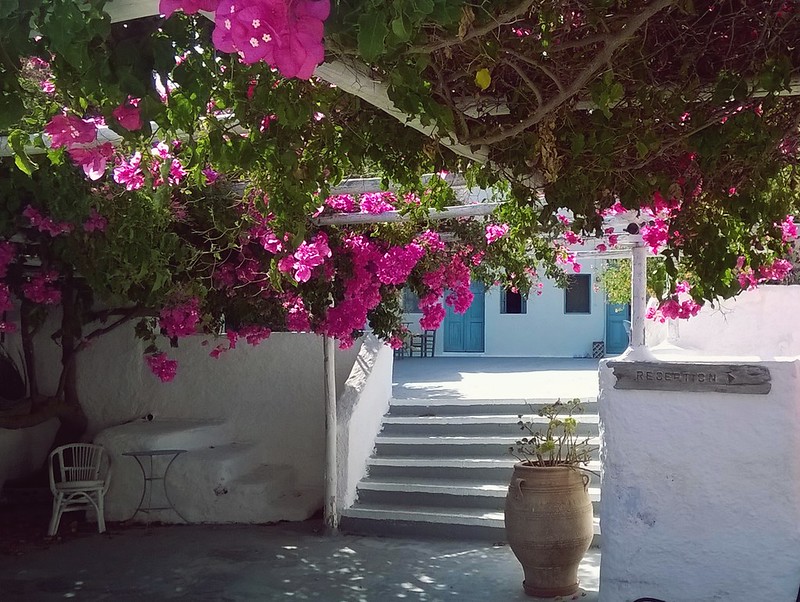
Comments
Post a Comment